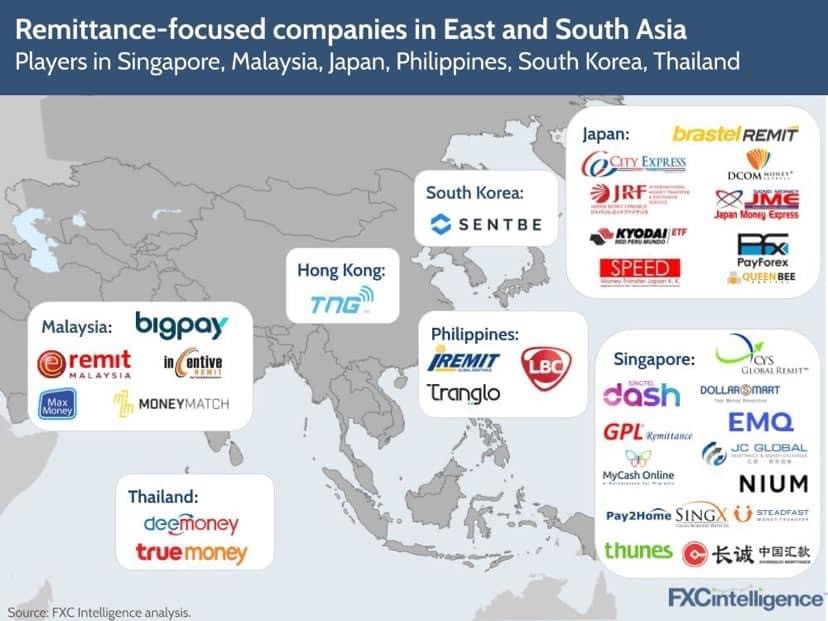Asia is seeing the emergence of a booming community of remittance-focused tech companies. These companies leverage technology and digital platforms to disrupt the legacy remittance value chain, bringing greater convenience and lower-costs to cross-border money transfer.
A new infographic produced by financial data firm FXCIntelligence showcases particularly developed ecosystems in Singapore and Japan where players such as Singtel Dash, EMQ and Brastel Remit are headquartered.

Remittance companies in East and South Asia, FXCIntelligence, April 2021
But recent market developments in the region signal that further growth is to be expected. Last month, Travelex, one of the world’s biggest foreign exchange brands, launched a new digital remittance offering in Asia Pacific (APAC). The service, which leverages Nium’s real-time payments technology and money transfer rails, went live in Australia and Singapore with additional APAC markets to be added in the coming months.
In March 2021, US-headquartered cryptocurrency firm Ripple agreed to acquire a 40% stake in Malaysian cross-border payment specialist Tranglo, citing growing customer demand for faster and cheaper cross-border transactions Asia and a desire to grow its payment network in Southeast Asia.
In Malaysia still, digital money service Merchantrade Asia has been consolidating its position in the cross-border remittance market, acquiring Valyou, a mobile fintech player, cross-border digital remittance service provider and e-money issuer, last year and purchasing an additional 21% stake in KLIQ, a fully-digital, cross-border remittance service from Singapore.
With a combined staff of more than 1,200 and a network of over 1,700 contact points, the acquisition of Valyou made Merchantrade Malaysia’s largest money services business.
In nearby Thailand, Chatchaval Jiaravanon, a member of the country’s richest clan, is betting on blockchain technology for faster, more efficient cross-border transactions. In 2018, Chatchaval invested about US$10 million to create Lightnet, a remittance service that uses blockchain to transfer money to a different country within a day.
Headquartered in Singapore, Lightnet raised US$31 million last year and has opened offices in countries including Thailand, the Philippines, South Korea and China. The startup has partnered with more than two dozen financial institutions, including Singapore’s United Overseas Bank and MoneyGram, and is currently working on ties with Visa, Switzerland’s SEBA Bank and others.
In Hong Kong, financial settlement network operator EMQ has been aggressively expanding its footprint across APAC after raising a US$20 million Series B funding round last year. In the past year, EMQ entered the South Korean market and expanded its payments capabilities in Japan and Vietnam.
COVID-19 drives demand for digital remittance
In China, tech conglomerate Tencent recently introduced a new cross-border payments and foreign currency services platform called WiseFX. The move came on the back of rising demand for more efficient cross-border transaction capabilities from both the retail and corporate segments, Forest Lin, corporate vice president at Tencent and concurrently president at Tencent Financial Technology, told the Asian Banker in January 2021.
“The closing of physical borders has not only led to the demand for better connectivity to perform overseas trades during the pandemic. The level of cross-border online commerce activity has also increased rapidly,” Lin told the media outlet. “Cross-border online commerce activities will continue to be an important driver of global growth in the recovery from COVID-19 this year and beyond.”
“We have also seen the demand for remittance services increase given that cross-border travel has nearly been brought to a standstill … Online remittance services are especially important to people who work overseas to provide financial support to their families back home.”
WiseFX focuses on corporate merchants, especially those in mainland China, helping them with cross-border transactions in foreign currencies. The new solution complements Tencent’s online remittance offering, which includes WeRemit, a platform for the retail segment.
Asia’s digital remittance providers are competing with a foreign fintech companies who are entering the region at an accelerated pace. Names such as Wise, formerly TransferWise, and Revolut, have all entered the region in the past two years.
The World Bank estimates that remittance flows to Asia Pacific amounted to US$266 billion in 2020, making the region the biggest recipient of global remittances. Asia Pacific surpassed by far Latin America and the Caribbean (US$96 billion), the Middle East and North Africa (US$55 billion), Europe and Central Asia (US$48 billion), and Sub-Saharan Africa (US$44 billion).








